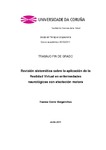Revisión sistemática sobre la aplicación de la realidad virtual en enfermedades neurológicas con afectación motora

Ver/Abrir
Use este enlace para citar
http://hdl.handle.net/2183/8263
Excepto si se señala otra cosa, la licencia del ítem se describe como Reconocimiento-NoComercial-SinObraDerivada 3.0 España
Colecciones
Metadatos
Mostrar el registro completo del ítemTítulo
Revisión sistemática sobre la aplicación de la realidad virtual en enfermedades neurológicas con afectación motoraAutor(es)
Directores
Cudeiro Mazaira, Francisco JavierRobles García, Verónica
Fecha
2011Centro/Dpto/Entidad
Universidade da Coruña. Facultade de Ciencias da SaúdeDescripción
Traballo fin de grao (UDC.FCS). Terapia ocupacional. Curso 2010/2011Resumen
Aims: the aim of this review is to examine systematically the evidence of the application of virtual reality as a therapy in persons with neurological diseases with motor disorders.
Methodology: we carried out a search in the literature of two electronic databases, PubMed and Scopus, identifying published papers between January 2000 and April 2011.
Results: following the search strategy discussed above were obtained 29 papers which examined the quality, type of study, the methodology used, the effects obtained and the involvement of occupational therapy with the following results: most studies of patient with stroke are no randomized controlled studies, the type of virtual reality primary used is semi-inmersive and the results after application of virtual reality are positive.
Conclusions: virtual reality is an effective tool for the evaluation and treatment of motor disorders in people with neurological disorders. There is a great involvement of occupational therapy in implementing this technology. However further randomized controlled studies are needed in order to implement into practice.
Derechos
Reconocimiento-NoComercial-SinObraDerivada 3.0 España






